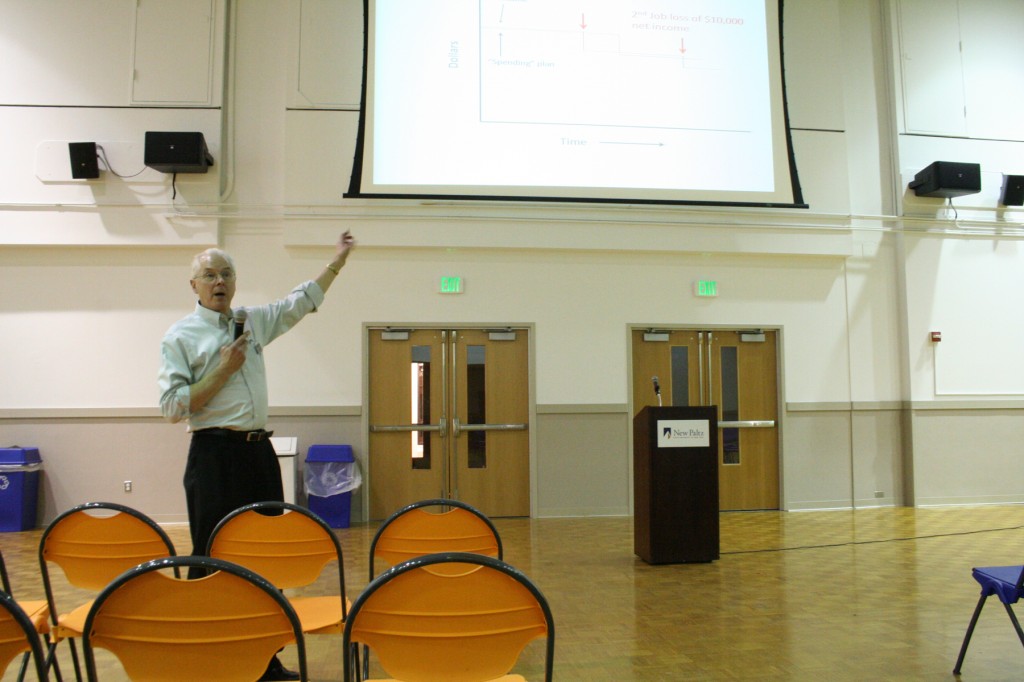

Over 30 students were in attendance at Tuesday’s budget forum, organized by administrators who hoped to explain how they were working to meet the $3.2 million deficit faced by the college.
The first forum designed for students, scheduled from 7 to 9 p.m. in the Student Union Multipurpose Room, was hosted by Interim President Donald Christian and Vice President of Finance and Administration Jackie DiStefano.
The pair first used metaphoric examples, comparing the college’s operating budget to that of a household. DiStefano said that after “the economy went to hell in 2008,” the college saw a loss in state taxpayer support, helping to create a budgetary shortfall.
Since Gov. Andrew Cuomo outlined his $132.9 billion plan last week, Christian said school officials should be forward-thinking in their financial planning because the SUNY system may face a 10 percent reduction in its operating budget.
“We are still trying to understand the implications of the governor’s budget proposal,” he said. “There could be a significant reduction on top of this.”
DiStefano said that as of Dec. 8, 2010, over $2.3 million in potential savings have been identified, with approximately 80 percent of these reductions coming from the non-instructional budget. Changes include the consolidation and reorganization of administrative functions, $400,000 savings in energy and service reductions at both the Sojourner Truth Library and the Samuel Dorsky Museum of Art. Over $380,000 in reductions could come from the instructional budget. Christian said different departments have proposed decreasing section sizes and the number of sections offered for certain courses.
Administrators presented other options that may be explored as the budget planning process continues, including program elimination, changes in course scheduling and academic unit consolidation.
Peter Brown, professor of foreign languages and vice president for Academics of the United University Professions union, said he was discouraged to see program elimination as a possible scenario when reserve funds exist.
“It is the union’s contention that no programs should be cut when we are sitting on money that is un-allocated,” he said.
But DiStefano said the generation of surplus funds is not guaranteed to continue at a constant rate, citing a decline in summer enrollment as an example of how the generation of certain revenues can change.
Brown then asked about the nature of the planning process, saying that he felt it was “designed to minimize discussion” since parties affected by the plan would not be notified until April 22.
Christian said announcing what programs are being considered for reduction or elimination before this date would generate ill will on campus.
“I don’t mean to sound heartless, but we all need to live with some ambiguity as the process continues,” he said. “Those in programs mentioned to be targeted for elimination would feel as though they have crosshairs on their chest.”
However, Student Association Vice President of Academic Affairs and Governance Caitlin Ryan said she still felt administrators should be more forthcoming as they make decisions about the future of different academic programs.
“It doesn’t seem like this process is entirely transparent,” she said. “We want to be a part of the decision making process, and that is what has been vocalized here tonight.”
Christian said he hoped to hear from other students in future budget forums this semester.
Jonathan Talmi, a third-year sociology major who attended Tuesday’s forum, said he hopes more students will take interest in how the budgetary deficit will affect them.
“I feel like I understand that, like everything else, it’s politics,” he said. “Hopefully, with more organization, student leaders can reach out to others who couldn’t be here tonight.”
